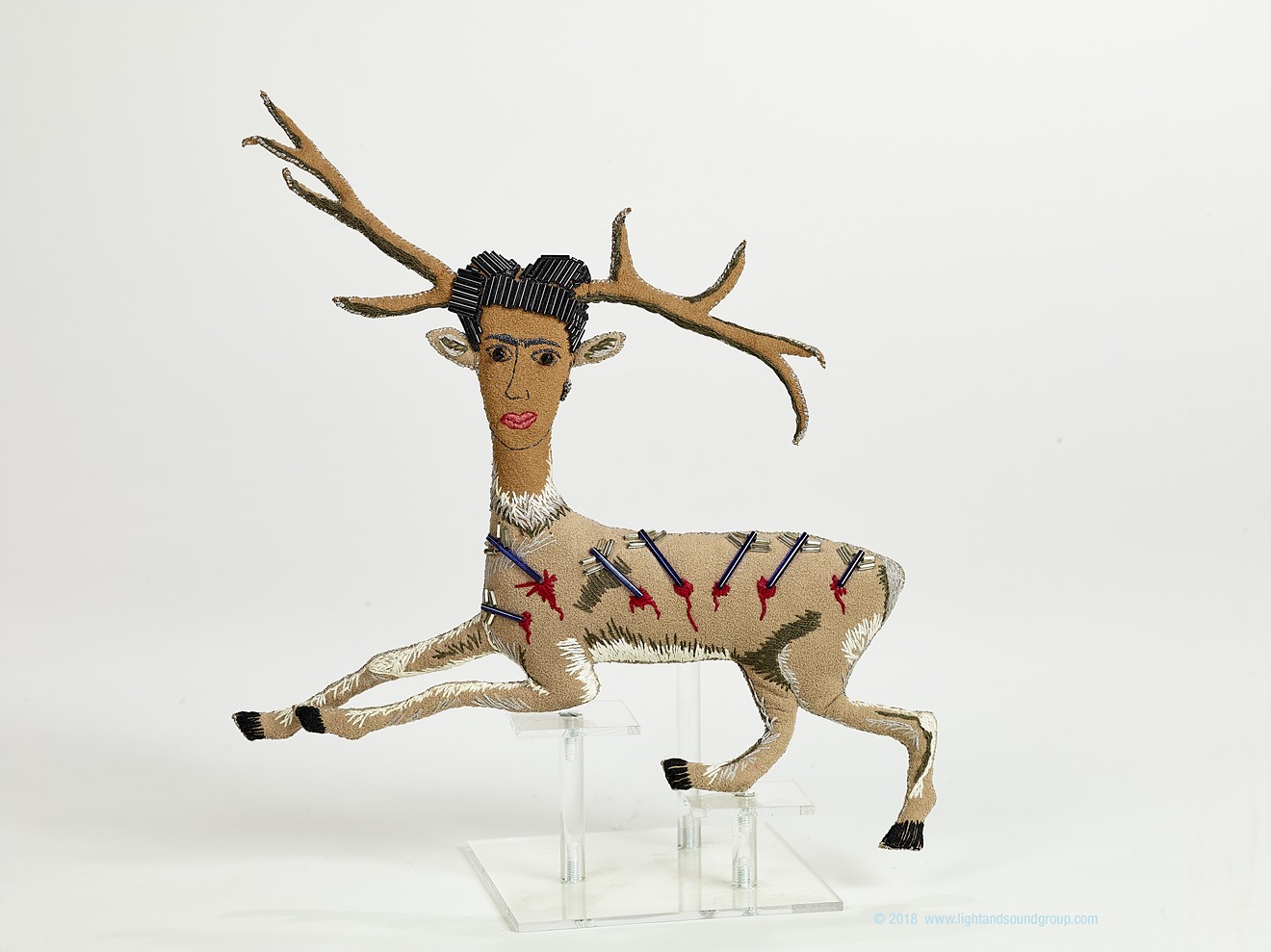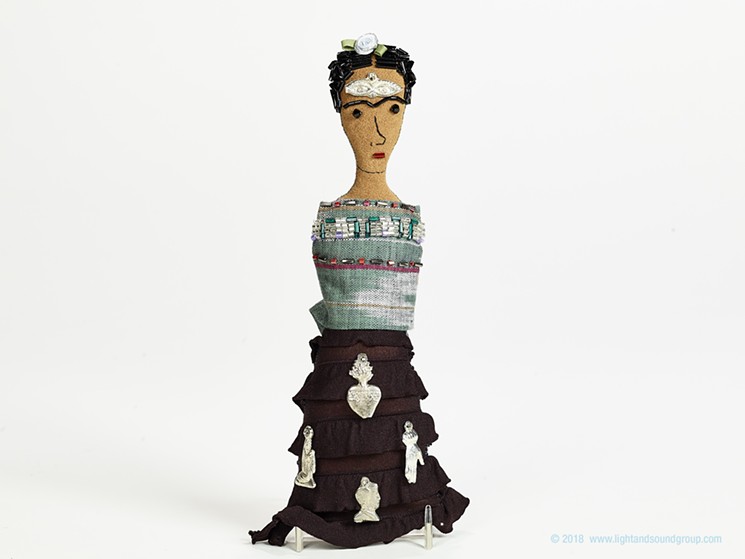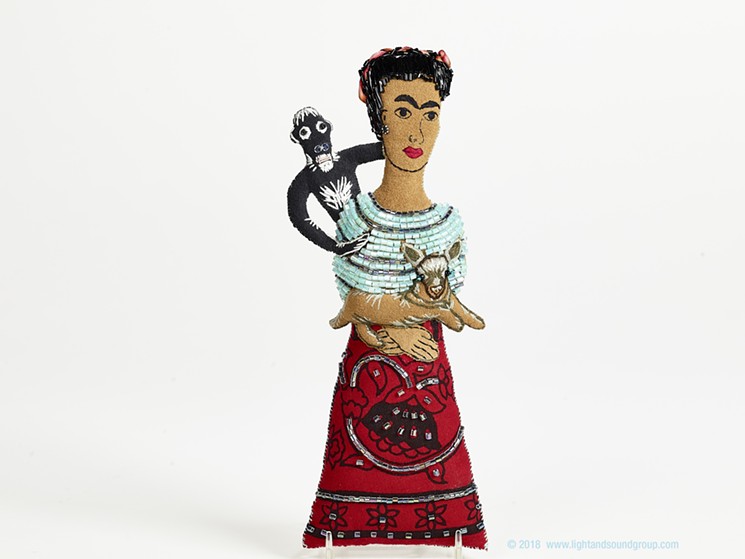Mexican artist Frida Kahlo de Rivera painted dozens of self-portraits during her brief life. She painted herself with flowers in her hair, rosy cheeks and a faint elegant mustache on her upper lip. She depicted herself pricked by pins, painfully supported by the metal girdle she wore after a trolley car left her disabled in 1925. She showed her heart, full of blood, and her neck adorned with thorns.
"I paint self-portraits because I am so often alone, because I am the person I know best," she famously explained.
Now Denver artist Nina Shope's depiction of Kahlo is the subject of a trademark dispute with the Panama-based corporation that claims to own Kahlo's branding rights.
On May 27, the Frida Kahlo Corporation sent online crafter hub Etsy a "notice of intellectual property infringement," claiming that two of Shope's dolls violated the company's trademark. In response, Etsy took down Shope's work. But instead of closing up shop, Shope sued the Frida Kahlo Corporation in federal court on June 5, asserting her right to create folk dolls in the likeness of the expectation-defying surrealist.
Raised in Wellesley, Massachusetts, Shope learned to knit, sew and embroider through craft kits given to her by an aunt. "I didn’t really want to wear the beaded jewelry I was making," she recalls. "But as early as middle and high school, I developed a deep passion for folk art, and one day I realized that I could use my needlework and beadwork skills to create amazing folk art-inspired objects that I would desperately want to own if I saw them in a store."
Around 2001, Shope started making dolls depicting the famed artist. From there, Shope created her own world of saints, skeletons and mermaids, eventually launching an Etsy account in 2009.
The author of Hangings, a collection of novellas, Shope moved to Denver in 2005 with then-boyfriend Christopher Narozny, author of Jonah Man. The two were married in 2008, spent a few years in Brooklyn, and returned to Denver in 2016, where Shope has focused on her doll collection.
Shope begins each piece with a freehand design on thick paper, then traces it onto Ultrasuede. She hand-beads the hair and embroiders the face, working to get the nose and eyes just right. She often works with recycled fabrics, embellishing them with beads, sequins, gems, milagros and cowrie shells.
"The hardest and most tedious part of the process comes next: sewing and stuffing the dolls," Shope admits. She uses eco-friendly, raw U.S.-grown cotton, but each doll must "be stuffed incredibly tightly to maintain the right shape, and sometimes I accidentally cut the fabric ... since I stuff them using tiny, sharp sewing scissors. That can be so frustrating, as can the distortion that occurs when stuffing the dolls."
Of course, small imperfections give each doll a unique spirit. Shope devotes four hours to small dolls and the larger ones can take days to make. "I know that no one will ever find something exactly like my creations, and that they are passionate offerings, replete with intriguing and inventive details and imbued with the energy and individuality of my artistry," she says.
When the Frida Kahlo Corporation challenged her rights regarding two of her pieces, Shope was preparing for her first show, which is still slated for December in Boulder's Madelife Gallery.
When artists and companies are served a take-down notice, Etsy will often take work down, which is what it did in this case. An Etsy spokesperson declined to comment on the specifics, instead pointing to its intellectual-property FAQ page, which includes resources for filing notices and counter notices.
"Etsy wants to keep itself protected — it wants to play the role of 'innocent third party' in all of this whenever things hit the fan," explains one Etsy tutorial that uses Bruce Wayne and Alfred to outline hypothetical disputes.
After hearing of the complaint, Shopes contacted an attorney, Rachael Lamkin, who points out that the Digital Millennium Copyright Act, which has become a blanket policy for most intellectual-property disputes online, doesn't leave many options for sellers. “The law makes platforms like Etsy favor the rights-holders," Lamkin says. "I wish there were better procedures so that if the take-down was improper, an attorney like me could send a letter to Amazon or Shopify or Etsy and have it reinstated.
“If I represent a client and I want a competitor to stop selling a product, I have to go into court and I have to demonstrate to a judge that my rights are valid, and I would most likely win the case. That’s what it takes to get an injunction in court — but now the rights-holders are getting an injunction with zero due process," Lamkin explains.
On top of that, Lamkin doesn't think anyone has the right to trademark Frida Kahlo depictions, since publicity rights to her image expired in Mexico in 2004, fifty years after her death. The U.S. Patent Office created precedent when it rejected trademarks for Amelia Earhart and Martha Washington dolls. Although the U.S. Patent Office approved a patent for Frida Kahlo dolls, Lamkin says that she thinks "the examiner didn’t know who Frida Kahlo was, and so it was issued.”
While this case specifically addresses the right to make Kahlo dolls, Lamkin believes that any artists who think they’ve been wrongly asked to take down work should find an attorney and fight. “What I hope people come away with is the sense that you should speak up to bullies and work to find a lawyer that will work with you," she says. "Don’t just let it happen. Every time the Frida Kahlo Corporation asserts a false take-down, they get stronger, and they get stronger for improper reasons.”
The Frida Kahlo Corporation made headlines last year over its licensing deal with Mattel's line of "inspiring women" Barbie dolls. Critics charged that Mattel lightened Kahlo's skin, shaved her face and gave her two long legs in their lineup; Kahlo great-niece Mara Cristina Romeo Pinedo fought to prevent the dolls from being distributed in Mexico and won an early injunction.
With the prevalence of online marketing, the Frida Kahlo Corporation submits take-down requests on a weekly basis, but this is the first time its ownership claims have been countered in a U.S. court.
"We have made a significant investment in protecting the Frida Kahlo legacy, brand and trademarks,” says Beatriz Alvarado, a company representative. “We are prepared to vigorously defend our intellectual property and trademarks whenever our rights have been violated, and to stop any confusion that may be created in the market by such infringing activity.”
Both parties accuse each other of attempting to profit off of Kahlo's legacy: Shope's filing claims that Kahlo would have sided with the common folk artist, and the corporation argues that Kahlo fought to protect the value of her work.
If the court does not interfere, Shope's lawsuit argues, "Frida Kahlo Corporation's actions [will continue to] significantly chill the market for Frida Kahlo dolls, including dolls that more accurately represent Frida Kahlo and the consuming public, including dolls that represent the Latina, gay, and persons-with-disabilities communities."
If Shope loses, she will have to stop selling her Kahlo dolls. But no court can silence her muse or stop her from creating other original designs, the says. In addition to embroidering anatomical hearts, Shope loves designing custom saints, including Saint Vulvinia, who stood by her sister's side during cancer treatment.
Whatever happens, Shope hopes that her work continues to speak to "kindred spirits — fellow folk art and Frida fanatics, lovers of dark and compelling beauty, empaths, artists, feminists, crafters and creators, and collectors of unusual objects," she says.
[
{
"name": "Air - MediumRectangle - Inline Content - Mobile Display Size",
"component": "12017618",
"insertPoint": "2",
"requiredCountToDisplay": "2"
},{
"name": "Editor Picks",
"component": "17242653",
"insertPoint": "4",
"requiredCountToDisplay": "1"
},{
"name": "Inline Links",
"component": "18838239",
"insertPoint": "8th",
"startingPoint": 8,
"requiredCountToDisplay": "7",
"maxInsertions": 25
},{
"name": "Air - MediumRectangle - Combo - Inline Content",
"component": "17261320",
"insertPoint": "8th",
"startingPoint": 8,
"requiredCountToDisplay": "7",
"maxInsertions": 25
},{
"name": "Inline Links",
"component": "18838239",
"insertPoint": "8th",
"startingPoint": 12,
"requiredCountToDisplay": "11",
"maxInsertions": 25
},{
"name": "Air - Leaderboard Tower - Combo - Inline Content",
"component": "17261321",
"insertPoint": "8th",
"startingPoint": 12,
"requiredCountToDisplay": "11",
"maxInsertions": 25
}
]















